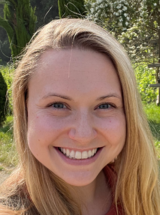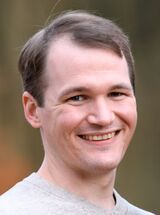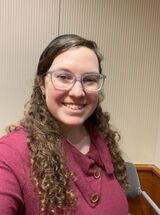Celebrating NGG Graduates
Please join us in our celebration as we highlight our NGG graduates.
The profiles are sectioned by degree type:
Doctor of Philosophy

Sydney Cason
Mentor: Erika Holzbaur, PhD
Thesis Title: Dynein Regulation in Axonal Autophagy
Research and Lab Description: Autophagy is a key recycling pathway necessary to maintain the health and function of cells. In neurons, autophagosomes envelop dysfunctional proteins and organelles in the axon, then are transported by molecular motor proteins to the soma for degradation. I aimed to understand both autophagosomal transport along axons and how autophagosomes degrade their cargo during that transit. I identified multiple mechanisms underlying autophagosomal transport, including a unique handoff between distinct motor accessory proteins depending upon the autophagosomal state. Our work provides invaluable insight into autophagy and axonal transport, both of which are dysfunctional in neurodegenerative disease.
Post PhD Plans: Postdoctoral Fellow in Pietro De Camilli's lab at Yale
Mentor Comment: For me, Sydney is the perfect role model for the next generation of neuroscientists and cell biologists – exceptionally thoughtful and creative, a leader in the lab and in the community, and a fully developed warm and wonderful person. I am so proud of all Dr. Cason has accomplished at Penn, and all she will accomplish going forward in what is sure to be an impressive career and a very happy life.

Alexis Crockett
Mentor: Jorge Alvarez, PhD
2021 Blavatnik Family Fellowship Recipient
Thesis Title: Intersection of Blood-Brain Barrier Impairment, Mitochondrial Dysfunction and Neuroinflammation in a Model for Schizophrenia
Research and Lab Description: The Alvarez lab is interested in understanding the role of the BBB in immune-brain signaling. My thesis focused on mitochondrial mechanisms of blood-brain barrier disruption in the human genetic condition 22q11.2 deletion syndrome, a model for schizophrenia.
Post PhD Plans: I have started a postdoctoral position at the Cleveland Clinic in the lab of Dr. Dimitrios Davalos, where I will use in vivo two photon imaging to study microglial-neuron interactions.
Mentor Comment: Alexis came to our laboratory due to her interest in the role played by non-neuronal cells in brain function. After joining the lab, Alexis quickly became a central pillar in leading our efforts to understand how a compromised neurovasculature (blood-brain barrier - BBB) contributes to the development of neuropsychiatric disorders (Crocket et al, Brain) and in the process was key in building our collaborative network on campus. Alexis was also generous with her time in helping others and mentoring trainees joining the lab. Her studies not only led to obtaining her Ph.D. but also allow us to continue developing as scientists. We are looking forward to seeing her growth during her post-doctoral training and beyond.

Ron DiTullio
Mentor: Vijay Balasubramanian, PhD and Yale Cohen, PhD
Thesis Title: Inference of representations through structure: Revisiting Marr's tri-level hypothesis of neuroscience
Research and Lab Description: Both biological and artificial neural networks are capable of learning extremely useful representations of their world. The exact form of these representations is the product of a complex interaction between the statistics of the world, the limits and biases of the network itself, and the nature of the task at hand. The goal of my research is to develop a rigorous understanding of this interaction to gain insights into how biological and artificial agents learn useful representations. I use tools from computational neuroscience, deep learning, and information theory to study the structure present at each level of this interaction: the input, the network, and the task and generate hypotheses from the results of these studies. I then use a combination of normative and circuit level modeling with experimental collaboration to test these hypotheses and determine the implications for what representations are used.
Post PhD Plans: I’m currently applying this approach to better understand the spatial navigation system of the rodent in the lab of Vijay Balasubramanian. After wrapping up our CRCNS collaboration between the Balasubramanian lab and the lab of Dori Derdikman I am looking to start a new post-doc focused on applying this approach in a deep learning context.
Mentor Comment: Vijay: Ron has been a bulwark of my lab for the last four years. He was an insightful scientist anchoring our research into spatial cognition with his broad erudition about the field. He was a leader in our community throughout his graduate studies, running our group meetings and helping to create the convivial and collaborative culture of the group. Ron has also been a totally dedicated teacher and mentor. During COVID he was my partner in maintaining and rebuilding the Theoretical and Computational Neuroscience course. I will be forever grateful for his counsel, wisdom and help on everything, from totally rebuilding the homeworks, to giving special topic lectures, to discussing challenging situations in class.
Yale: We were lucky to have Ron in our lab! Ron’s good cheer and upbeat attitude always brightened our day. He was generous with his time and was always willing to help explain an analysis to someone and to mentor junior lab members. Indeed, Ron published more with his non-thesis advisors than with his thesis advisors! Ron was an outstanding teacher and spent a great deal of time working on his didactic teaching skills. Ron had complete intellectual ownership of his thesis and thesis projects. He thought deeply about the meaning of his work, its limitations, and implications. Ultimately, Ron wants to continue in academics and obtain a faculty position in computational neuroscience. We expect nothing but continued greatness and good cheer from Ron as he continues his journey!

Darrell Eacret
Mentor: Julie Blendy, PhD
Thesis Title: Bidirectional relationship between opioids and disrupted sleep
Research and Lab Description: Research in the Blendy Lab is aimed at understanding the molecular basis for the biochemical and behavioral changes associated with chronic drug use. How drugs exert effects that lead to long-term adaptations within the central nervous system is not well understood. My thesis used this framework to focus on how chronic drug use affects sleep, and whether certain neurons (Mu-opioid receptor expressing neurons in the Paraventricular Nucleus of the Thalamus) mediate the relationship between opioids and disrupted sleep.
Post PhD Plans: I have been working as a Strategy Insights & Planning Associate Consultant at ZS Associates in Philadelphia since October 2022
Mentor Comment: I was sure Darrell was going to join another lab and was so excited that he decided to come to mine instead! He quickly became the go to person for just about everything related to science, and then some! His intellect combined with his technical prowess as well as his practical and creative skill sets allowed him to accomplish so much in what felt like a very short time. With 6 papers, 4 first authored, he excelled at performing experiments, analyzing data and writing manuscripts. All transferable skills that will guarantee his well-deserved success wherever he goes. His personality blended with everyone in the lab and his quick wit made our lab a better place. We all miss him.

Delaney Fischer
Mentor: Elizabeth Heller, PhD
Thesis Title: Sex-Specific Regulation of Promoter Bivalency in the Mouse Striatum
Research and Lab Description: The Heller Lab studies the gene regulatory mechanisms that underlie psychiatric disease. To approach this problem, we apply preclinical mouse paradigms of drug addiction and depression to define functionally relevant histone modifications and transcription factors. Because the syndromes of addiction and depression persist long after cessation of the insult, chromatin remodeling is an attractive mechanism for such long-lasting effects and presents an intriguing target for therapeutic intervention.
Post PhD Plans: Delaney is currently an Associate Consultant at Lumanity Bioconsulting.
Mentor Comment: Delaney Fischer contributed substantially to research on the role of Nr4a1 and chromatin bivalency in cocaine addiction. Importantly, Delaney identified a sex-difference in the activation of Nr4a1 gene expression. She applied a very challenging protocol, sequential chromatin-precipitation, to the mouse brain in order to characterize the simultaneous enrichment of distinct histone modifications at this single locus in vivo. Beyond this, Delaney collaborated with others in our group to establish a novel protocol, ICuRuS, to profile the genome-wide enrichment of histone modifications in a specific neuronal subtype isolated from mouse brain. Throughout her PhD training, Delaney exhibited her deep intellect, persistence, and an ethical and rigorous approach to collecting and analyzing data. She mentored many students and collaborators throughout her time at Penn, and made enormous contributions to the Neuroscience Graduate Group.

Vanessa Fleites
Mentor: Mariella De Biasi, PhD
Thesis Title: Modeling Maternal Opioid Use Disorder and its Consequences in Mice Offspring

Nitsan Goldstein
Mentor: Nick Betley, PhD
Saul Winegrad Award for Outstanding Dissertation
Thesis Title: Dynamic control of behavior by hypothalamic hunger neurons
Research and Lab Description: The Betley Lab studies the neural circuits regulating survival behaviors and how they respond to changes in the environment or internal state. My thesis work investigated how the brain precisely controls food intake by responding to signals from the periphery, tapping into reward circuitry, and filtering other competing needs.
Post PhD Plans: Postdoctoral fellowship at MIT with Dr. Fan Wang
Mentor Comment: Nitsan is a force of nature. Her focus was like the eye of a well-formed hurricane and her findings blew apart preconceived notions in at least two distinct fields of neuroscience. Her work focused on how reciprocal signaling between the brain and the body influences physiology to control behavior and influence perception. The trail of projects from the work she nucleated will keep many laboratories busy for years. Nitsan is currently performing postdoctoral research with Fan Wang at MIT and I look forward to watching her career build momentum, much like the tropical storms of late summer.

Jennifer Hafycz
Mentor: Nirmala Nirinjini Naidoo, PhD
Thesis Title: The Role of the Unfolded Protein Response on Sleep and Cognition in Aging and Alzheimer's Disease
Mentor Comment: Jen has been a terrific member of our lab; collaborative, conscientious and persistent. She did an enormous amount of work completing two projects for her dissertation. Her projects encompassed assessing the impact of improving proteostasis on sleep and cognitive behavior in both aged and Alzheimer’s disease mouse models. The study she completed also provides new insights into molecular mechanisms underlying age related behavioral changes and the timing of interventional therapy.

Michael Iannacone
Mentor: David Raizen, MD, PhD
Thesis Title: Neural Mechanisms of Sickness Sleep and Fatigue
Research and Lab Description: My work in the Raizen lab focused on sleep and fatigue. I used both mice and nematodes to understand how sickness, like infection and cancer, causes fatigue. I studied neuropeptide signals in the brain as the mechanism driving this behavior.
Post PhD Plans: I currently work as a post-doc in the Raizen lab as I explore future career opportunities.
Mentor Comment: Mike’s thesis project focused on understanding mechanisms that underlie sleep during illness. For these studies, he used both the nematode C. elegans and the laboratory mouse. He showed remarkable independence and resourcefulness for both projects. In particular, since my lab was new to mouse research, it took tremendous initiative on his part to get that project going. He wrote grant proposals to fund this research as well as animal protocols to comply with regulatory bodies. In addition to science, Mike was very involved in journal club fully run by graduate students titled “small model systems journal club”. He showed many leadership traits both in and out of the lab.

Emma Janke
Mentor: Minghong Ma, PhD
Thesis Title: A quantitative approach to breathing in emotionally-salient states in mice
Research and Lab Description: Minghong Ma’s lab focuses on neural circuits that drive behavior with an emphasis on olfaction-related behaviors and their associated brain regions. My research specifically focused on the diversity of mouse breathing patterns throughout behavior and how well breathing links with behaviors and associated internal states such as fear. Through unbiased and supervised machine learning, we showed that mouse behaviors which appear similar, like different forms of immobility, may be distinguished by their breathing patterns. Ultimately, we suggest that understudied breathing features like breath-holds may be indicative of fear and merit future study in the context of fear circuitry. I also collaborated on a range of in vivo circuits studies that investigated behaviors such as scratching, sleep, grooming, and arousal.
Post PhD Plans: I am now a consultant at Bluestar BioAdvisors.
Mentor Comment: Emma has long-term interests in neural control of animal behaviors, and she is the first to apply machine learning tools to cluster and classify mouse behaviors based on breathing patterns. She is bright, efficient, and resilient, and the pandemic did not slow her down. Emma is a wonderful lab citizen, and she is always friendly, thoughtful, and collaborative. In addition to her main project, she has co-authored five other articles and two more in the near future. During her graduate training, she received an NRSA F31 fellowship and landed on a dream job. We wish her all the best in her new endeavor!

Harang Ju
Mentor: Dani S. Bassett, PhD
Thesis Title: The Network Science of Distributed Representational Systems

Marissa Kamarck
Mentor: Joel Mainland, PhD
Thesis Title: How do your genes smell? Applying Genetic Tools To Understand Human Olfactory Perception
Mentor Comment: Marissa was a fantastic member of the lab. She has a broad curiosity and developed skills in human psychophysics, data science, molecular biology, machine learning, and bioinformatics. Marissa is an incredibly fast learner and loves to dive into new problems. She was also a great lab citizen, always happy to train new members, improve everyone's code, or plan an outing for the lab.

Kyra Levy
Mentor: Thomas Jongens, PhD
Thesis Title: Investigation of metabolism and autism-relevant behaviors in Drosophila lacking neurexin-1
Research and Lab Description: Although autism is typically characterized by differences in language, social interaction and restrictive, repetitive behaviors, it is becoming more well known in the field that alterations in energy metabolism and mitochondrial function are comorbid disorders in autism. The synaptic cell adhesion molecule, neurexin-1 (NRXN1), has previously been implicated in autism, and here we show that in Drosophila melanogaster, the homologue of NRXN1, called Nrx-1, regulates energy metabolism and nutrient homeostasis. First, we show that Nrx-1-null flies exhibit decreased resistance to nutrient deprivation and heat stress compared to controls. Additionally, Nrx-1 mutants exhibit a significantly altered metabolic profile characterized by decreased lipid and carbohydrate stores. Nrx-1-null Drosophila also exhibit diminished levels of nicotinamide adenine dinucleotide (NAD+), an important coenzyme in major energy metabolism pathways. Moreover, loss of Nrx-1 resulted in striking abnormalities in mitochondrial morphology in the flight muscle of Nrx-1-null Drosophila and impaired flight ability in these flies. Further, following a mechanical shock Nrx-1-null flies exhibited seizure-like activity, a phenotype previously linked to defects in mitochondrial metabolism and a common symptom of patients with NRXN1 deletions. The current studies indicate a novel role for NRXN1 in the regulation of energy metabolism and uncover a clinically relevant seizure phenotype in Drosophila lacking Nrx-1.
Post PhD Plans: I’m currently a consultant at Boston Consulting Group

Claudia Lopez
Mentor: Kelly Jordan-Sciutto, PhD
Thesis Title: Mechanisms regulating amyloid precursor processing enzymes in a model of HIV-associated neurocognitive disorders

Alexandra Perlegos
Mentor: Nancy Bonini, PhD
Thesis Title: The impact of m6A in the Drosophila brain on stress, aging, and disease
Research and Lab Description: The Bonini lab studies the mechanisms of neurodegenerative disease and aging using Drosophila, as a model system and genetic tool. My dissertation uncovered the in vivo role of the RNA modification m6A in the brain under stress conditions of heat stress, neurodegenerative disease, and aging.
Post PhD Plans: I am currently tying up some loose ends in the Bonini lab and completing some final papers! With plans to move towards the west coast for post-doctoral studies.
Mentor Comment: Alex is a truly amazing scientist! She has so many special qualities that make her super fun, exciting, thrilling to interact with. Among these for great success is that she loves to play in the lab—she is constantly coming up with and testing out new ideas! And beyond this, she is gifted with insight, as most of her playing leads to amazing new discoveries! I am super lucky to have had the chance to work with her—it will be thrilling watching her achieve ever higher pinnacles in her career!

Adam Pines
Mentors: Theodore Satterthwaite, MD
Thesis Title: Layers of Maturation in Cortical Hierarchies
Research and Lab Description: Work centered on measuring hierarchical cortical organization and maturation in neurodevelopment.
Post PhD Plans: Postdoctoral fellowship with Dr. Leanne Williams
Mentor Comment: Adam was the grad student every faculty member dreams of: brilliant, hardworking, creative, collaborative, independent, and fun. During his PhD he wrote three major first author papers that define fundamental properties of functional brain development; these were published in top journals such as Neuron and Nature Communications. In addition to successfully competing for a NIH F31 fellowship, he contributed to an astonishing 18 papers while in the lab. Beloved by all, we miss him greatly and toast his many successes.

Greer Prettyman
Mentor: Daniel Wolf, MD, PhD
Thesis Title: Neurobehavioral Mechanisms of Motivation and its Impairment
Research and Lab Description: The Wolf lab seeks to understand how motivation is generated in the brain and use this understanding to develop new ways to treat motivation impairment due to psychiatric illness. My thesis reseach characterized neural activation patterns and decision-making behaviors related to motivation across different contexts—extrinsic, intrinsic, and social—and investigated how individual variation in motivation impairment and clinical symptomatology related to these neurobehavioral processes.
Post PhD Plans: Associate Director of Scientific Services at Red Nucleus
Mentor Comment: Greer is my first graduate student, and it has been a true privilege for me to work with her these past four years - we have learned a lot together! Greer has done fantastic work on several projects examining different aspects of motivation - some of these are firsts in the field including the first application functional neuroimaging to study intrinsic motivation impairment in individuals at risk for psychosis, and developing her own new paradigm to study willingness to exert social effort to obtain social reward. Greer is also an outstanding writer, and she is great at breaking down and explaining complex topics in ways non-experts can grasp. Her love of this work led her to choose a career in scientific and medical writing, a field where she can continue to use and grow her scientific interests, and have the impact she wants to have on public health and welfare. I am excited to see her next career stage unfold!

Melanie Schaffler
Mentor: Julie Blendy, PhD and Ishmail Abdus-Saboor, PhD
Thesis Title: A Critical Role for Touch Neurons in a Skin-Brain Pathway for Stress Resilience
Research and Lab Description: The Abdus-Saboor lab (now at Columbia) is interested in how the brain encodes responses to tactile sensation, giving rise to pain and pleasure. My thesis work identified a population of sensory neurons in the skin that engage networks across the brain to promote stress resilience.
Post PhD Plans: I have been working as a Regulatory Affairs Associate at Teva Pharmaceuticals since August 2022.
Mentor Comment: Though I only advised Melanie in the last part of training, while she completed her work at Penn, I enjoyed talking with her about her project, and listening to her interpretations of her at times very complex data. She was a joy to have as part of our group.

Daniel Schonhaut
Mentor: Michael Kahana, PhD
Thesis Title: Time, space, and rhythm across neurons in the human medial temporal lobe and prefrontal cortex

Jessica Schwarz
Mentor: Amita Sehgal, PhD
2020 HHMI Gilliam Fellowship Recipient
Thesis Title: Aging Reprograms Circadian Metabolic and Transcriptional Rhythms
Research and Lab Description: The Sehgal lab seeks to understand the molecular and cellular networks that drive circadian rhythms, in particular rhythmic behaviors such as sleep. My thesis work investigates age-related changes in the circadian metabolome as well as the contribution of systemic signals to age-related changes in peripheral tissues.
Post PhD Plans: Current Postdoc in Dr. Joel Blanchard’s lab at the Icahn School of Medicine at Mt. Sinai
Mentor Comment: It was an absolute joy to have Jessica in the lab. Jess’s willingness to take on ambitious projects, her tenacity in persevering with them even when the going got tough and her super organizational skills that allowed her to multi-task and keep moving things along, were all very impressive. She also is credited with conducting the first human study in our lab, where she actually had to recruit subjects of different ages. This project was certainly not helped by the pandemic, but Jessica got it done. She was also an amazing lab citizen, rallying the lab for research purposes (e.g. lab cleanups) and social activities. Not to mention, as a second year student, Jessica got students together to organize a student-run course on circadian rhythms and sleep. And while doing all of this, she got an NIH diversity supplement and a Gilliam fellowship to support her work. We miss Jess dearly; her postdoctoral lab is lucky to have her!

Hannah Shoenhard
Mentor: Michael Granato, PhD
Thesis Title: The Calcium-Sensing Receptor (CaSR) regulates zebrafish sensorimotor decision making via a genetically defined cluster of hindbrain neurons
Research and Lab Description: The Granato lab uses larval zebrafish as a model system to identify genes that regulate fundamental aspects of behavior such as sensory thresholds, habituation, and simple forms of decision-making. For her PhD research, Hannah helped to identify a gene that alters behavioral responses of a surprising loud noise. By leveraging genetic tools, microscopy, and multivariate statistics, she was able to figure out the specific place in the zebrafish brain where that gene acts.
Post PhD Plans: Hannah is currently doing postdoctoral research in the lab of Dr. Amita Sehgal at UPenn, where she hopes to apply her skills in behavioral genetics and imaging to a project that bridges memory, cell biology, and sleep.
Mentor Comment: Hannah’s thesis research provided fundamental molecular and neural circuitry insights about the decision making process in animals. Hannah is a truly outstanding scientist, and she is also a generous and kind person who helped promote a positive and inclusive culture within my laboratory. Besides her amazing science Hannah has a strong passion for science outreach, having been an active member of serval programs including GLIA and the Philadelphia Science Festival. I am so proud of Hannah and her achievements, and I look forward to her continued success!

Rebecca Somach
Mentor: Akiva Cohen, PhD
Thesis Title: Effects of Mild Traumatic Brain Injury on Orexin Neuron Circuitry in Male and Female Mice.
Research and Lab Description: The Cohen lab investigates how mild traumatic brain injury (mTBI) alters brain circuitry involved in sleep and in spatial, working and fear memory. The lab employs behavioral paradigms in concert with in vivo and in vitro physiological techniques to interrogate the circuitry involved in sleep and the above cognitive functions. My own thesis work uncovered that calcium needed for the slow afterhyperpolarization (AHPslow) in viscerosensory neurons is mediated by Ca-induced Ca release from internal stores in close proximity to AHPslow channels and sparked my abiding interest in bridging the gap between behavior and electrophysiology.
Post PhD Plans: I am going to be teaching a year of Neurobiology courses as an interim lecturer at Bryn Mawr College, after which I plan to continue in academia and pursue a post-doctoral fellowship.
Mentor Comment: Rebecca was a terrific graduate student. Her thesis was an exercise in tenacity, persistence and innovation especially during COVID lockdown. Rebecca’s careful and consistent data analyses, as well as her determination, skill, and constant positive outlook will serve her well in her future scientific endeavors. It was a pleasure and honor to have Rebecca as a member of the laboratory. She was an excellent leader, colleague, friend and mentor and we all look forward to the promising career that lies ahead.

Thesis Title: Elucidating Gene Regulatory Roles of DNA Modifications and Active DNA Demethylation Pathways
Combined Degree, MD-PhD

Andre Revell
Mentors: Kate Davis, MD, MS, FAES; Brian Litt, MD
Thesis Title: Localizing Seizure Onset With Diffusion Models
Mentor Comment: Andy is one of our most capable and creative students. He is a superb computer and data scientist, a thoughtful, creative researcher, and one of the absolute best graphic artists we have had in the center. Andy has a great sense for crafting impactful, meticulous research, and his work has advanced the area of translational neuroimaging research, particularly using both MRI and intracranial EEG, to characterize epileptic networks, the onset and spread of seizures. His work will impact not only quantitative research in epilepsy, but also in other areas of translational neuroengineering that use imaging and neurophysiology to guide care. As a person, Andy is thoughtful, a wonderful scientific citizen, reserved, but warm and a great teacher and mentor. Andy has made wonderful, impactful contributions to our field, at the intersection of brain imaging, electrophysiology and clinical care. He is headed to an extremely bright career in Neuroradiology and we will really miss him!


